Excavation Contractors Muscatine
Find the best Excavation Contractors Near Me in Muscatine
Receive up to 3 Excavation Companies quotes for your project today! Compare profiles, reviews, accreditations, portfolio, etc... and choose the best deal.

VA Forestry Mulching & Excavating
518 reviewsAmes, USWhat We Do Primarily, we do what we say we’re going to do, and we strive to do it right! From commercial site preparation jobs to our work for farmers, hunters, and other individual landowners, we bring a seasoned, pragmatic, honest and common-sense approach to the table. We Take Pride In Our Work We’re proud of every completed project and have many satisfied repeat customers. Below is more information on the type of work we do as a grading and excavation general contractor.
- Services
- Why Us?
- Our Team
- Testimonials
- Gallery
Get Quote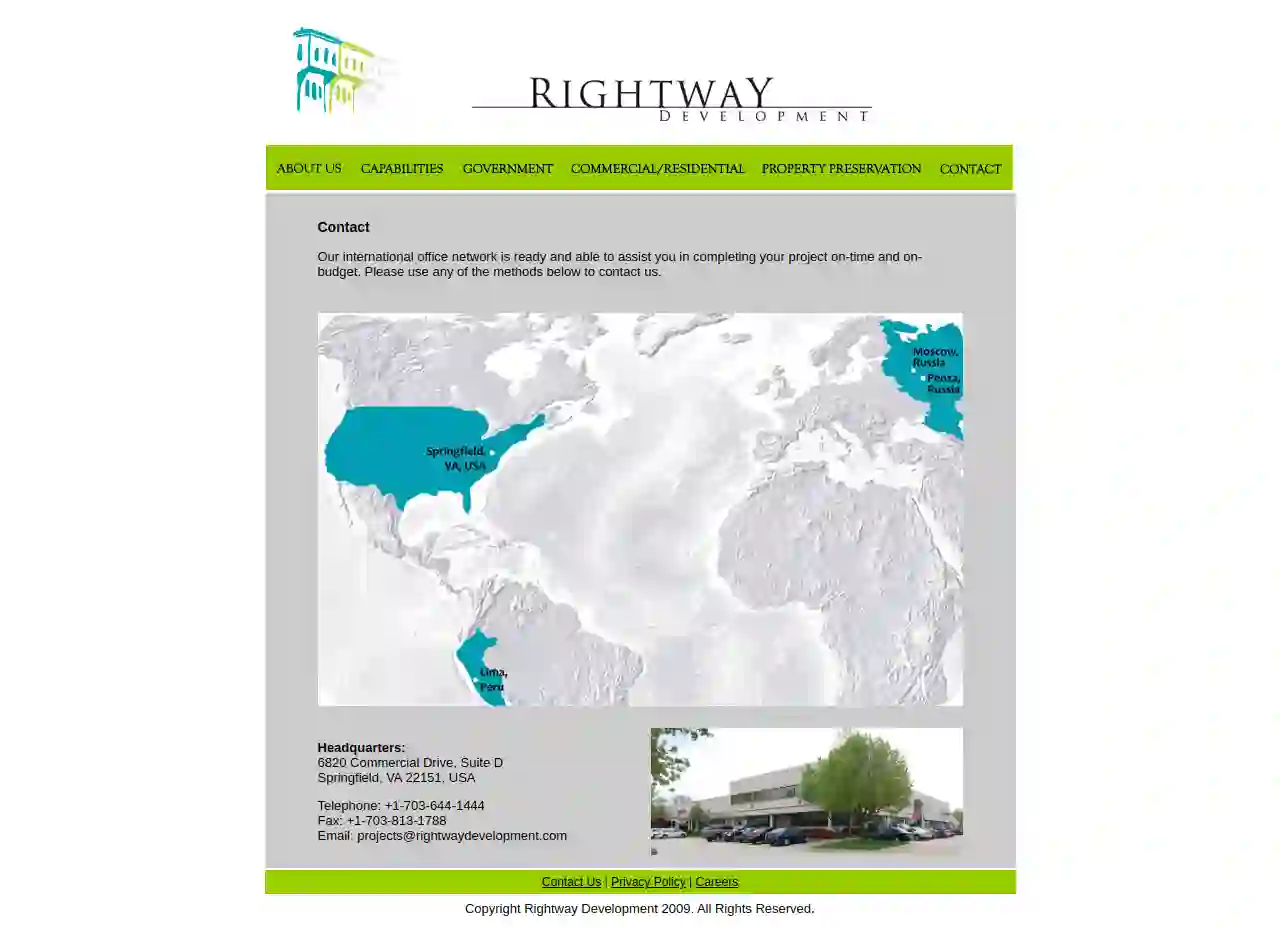
Rightway Development
6820 Commercial Drive, Suite D, Springfield, 22151, USAbout Rightway Development Rightway Development Inc., a leading construction and contracting company, specializes in a wide range of government, commercial, and residential construction projects, as well as property preservation services. Our commitment to reliability, quality, and efficiency ensures our clients' needs are met with confidence. Our teams have successfully completed projects across the United States for a diverse clientele, including national and local government entities, major banks and corporations, and small to medium-sized local businesses. Rightway possesses the experience and expertise to handle projects of varying sizes, scopes, and locations. As a Class-A licensed general contractor with a vast network of crews and specialty trades, we take pride in delivering projects accurately and on time. At Rightway, our primary goal is to ensure your deadlines and specifications are met. We establish a clear understanding of our clients' requirements, maintain open communication with all parties involved, and approach every project with meticulous attention to detail.
- Services
- Why Us?
- Gallery
Get Quote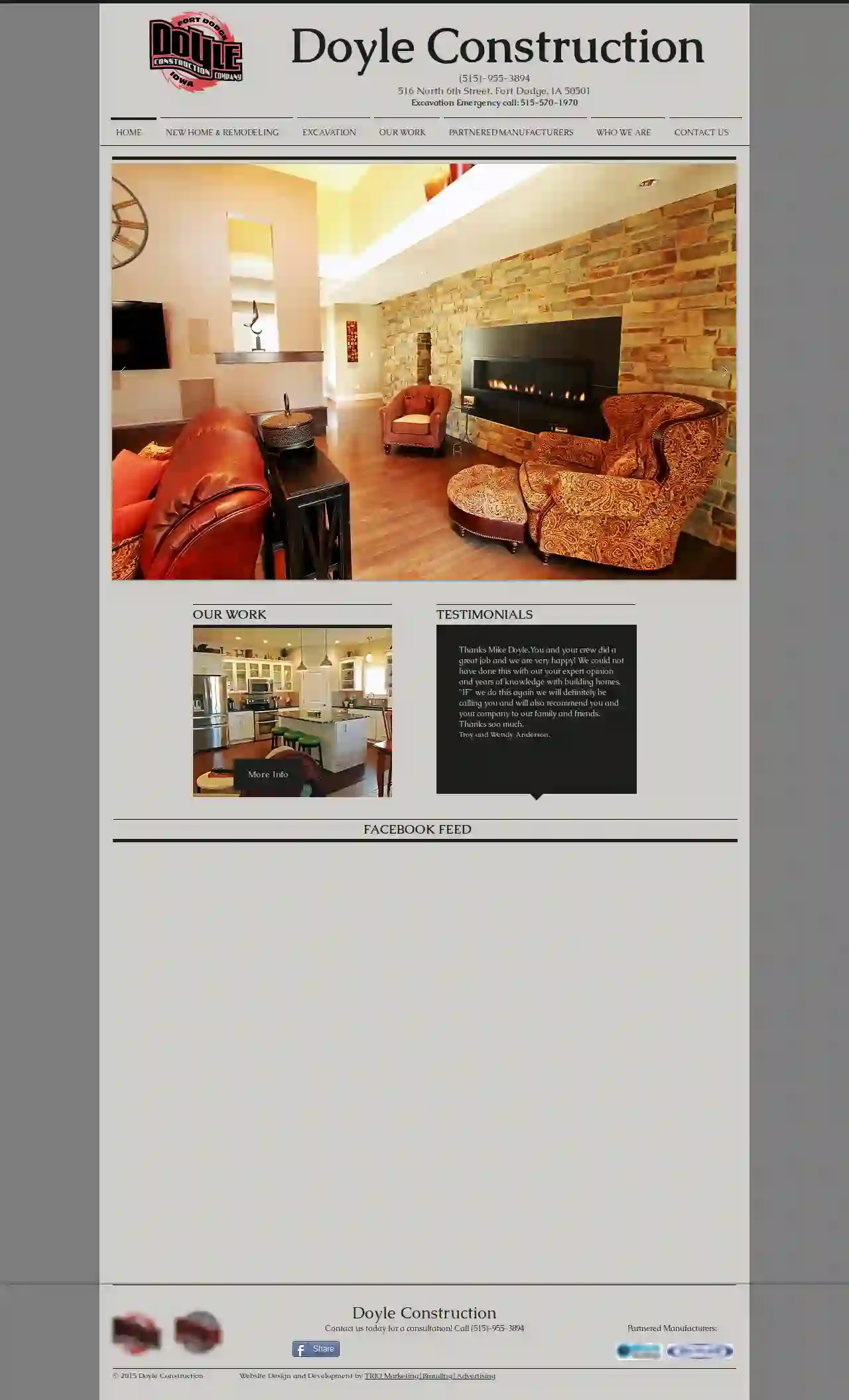
Doyle Construction
4.26 reviews516 North 6th Street, Fort Dodge, 50501, USDoyle Construction Doyle Construction is a family-owned and operated business with a long history of providing quality construction services to the Fort Dodge area. We specialize in new home construction, remodeling, and excavation. Our team of experienced professionals is committed to providing our clients with the highest level of service and craftsmanship. We are proud to be a part of the Fort Dodge community and we are dedicated to building homes and businesses that our community can be proud of. We are committed to providing our clients with the highest level of service and craftsmanship. We are proud to be a part of the Fort Dodge community and we are dedicated to building homes and businesses that our community can be proud of. We are committed to providing our clients with the highest level of service and craftsmanship. We are proud to be a part of the Fort Dodge community and we are dedicated to building homes and businesses that our community can be proud of.
- Services
- Why Us?
- Testimonials
- Gallery
Get Quote
NE Iowa Excavating
1629 Lansing Harpers Road, Lansing, 52151, USNE Iowa Excavating: Your Trusted Partner for Excavation and Land Management in Allamakee County NE Iowa Excavating is a locally owned and operated excavating contractor serving Allamakee County and surrounding areas. We are committed to providing high-quality, reliable services at competitive prices. Our team of experienced professionals is dedicated to exceeding your expectations and delivering exceptional results. We offer a wide range of services, including: Excavating Grading Leveling Landscaping Rockscaping Trenching Bulldozing Pond Building/Restoration Food Plots Logging Roads Culvert Installation & Water Channeling Rockscaping, Hillside Terracing, & Retaining Walls Gravel Grading, Repairs, Leveling, & Snow Removal Whether you need a simple driveway installed or a complex site development project completed, we have the expertise and equipment to handle the job. We are committed to providing our clients with the highest level of service and satisfaction. Contact us today for a free estimate!
- Services
- Why Us?
- Gallery
Get Quote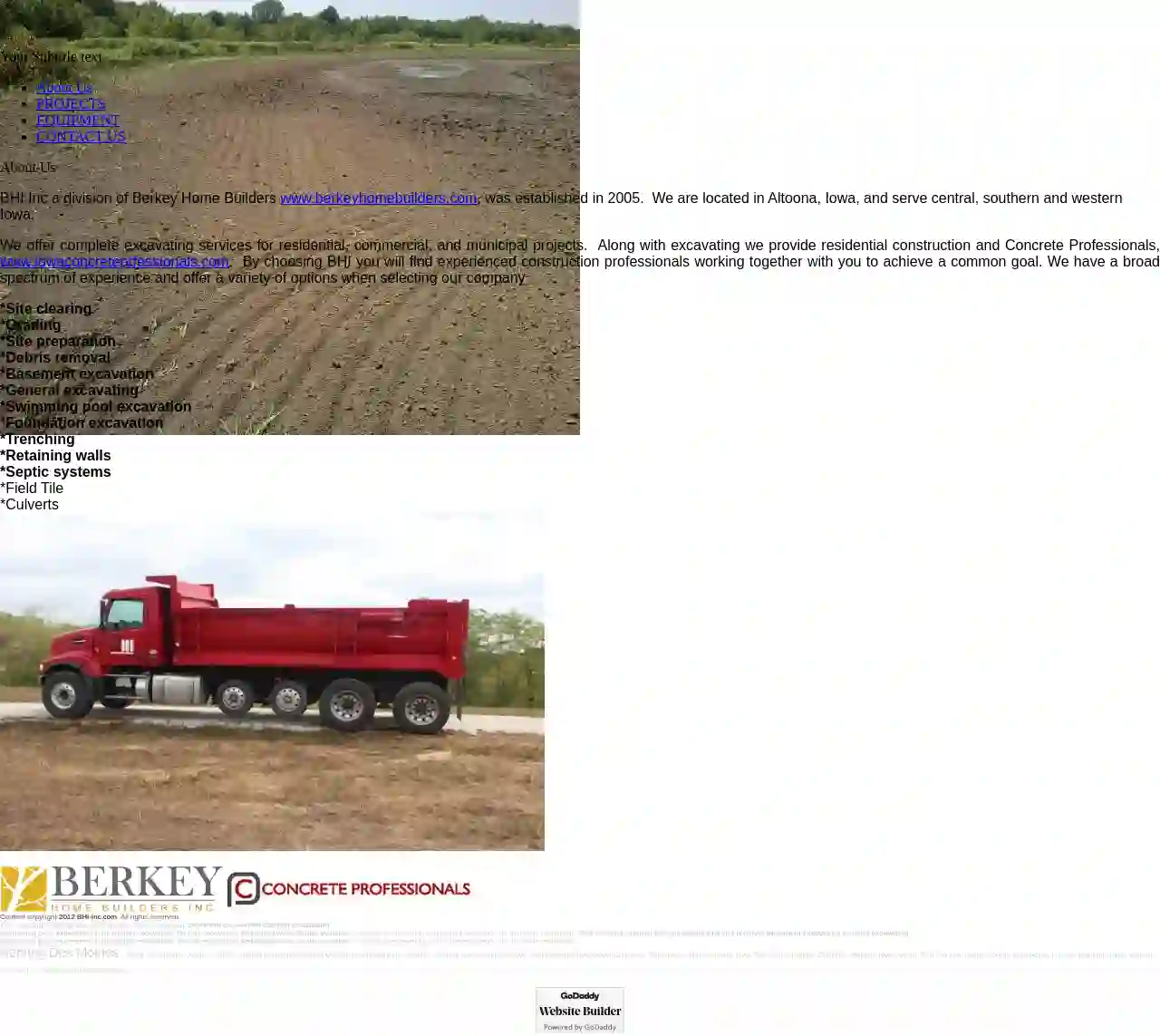
BHI-Inc
Des Moines, USAbout BHI Inc. BHI Inc, a division of Berkey Home Builders ( www.berkeyhomebuilders.com ), was established in 2005. We are located in Altoona, Iowa, and serve central, southern, and western Iowa. We offer complete excavating services for residential, commercial, and municipal projects. Along with excavating, we provide residential construction and Concrete Professionals ( www.iowaconcreteprfessionals.com ). By choosing BHI, you will find experienced construction professionals working together with you to achieve a common goal. We have a broad spectrum of experience and offer a variety of options when selecting our company.
- Services
- Why Us?
- Gallery
Get Quote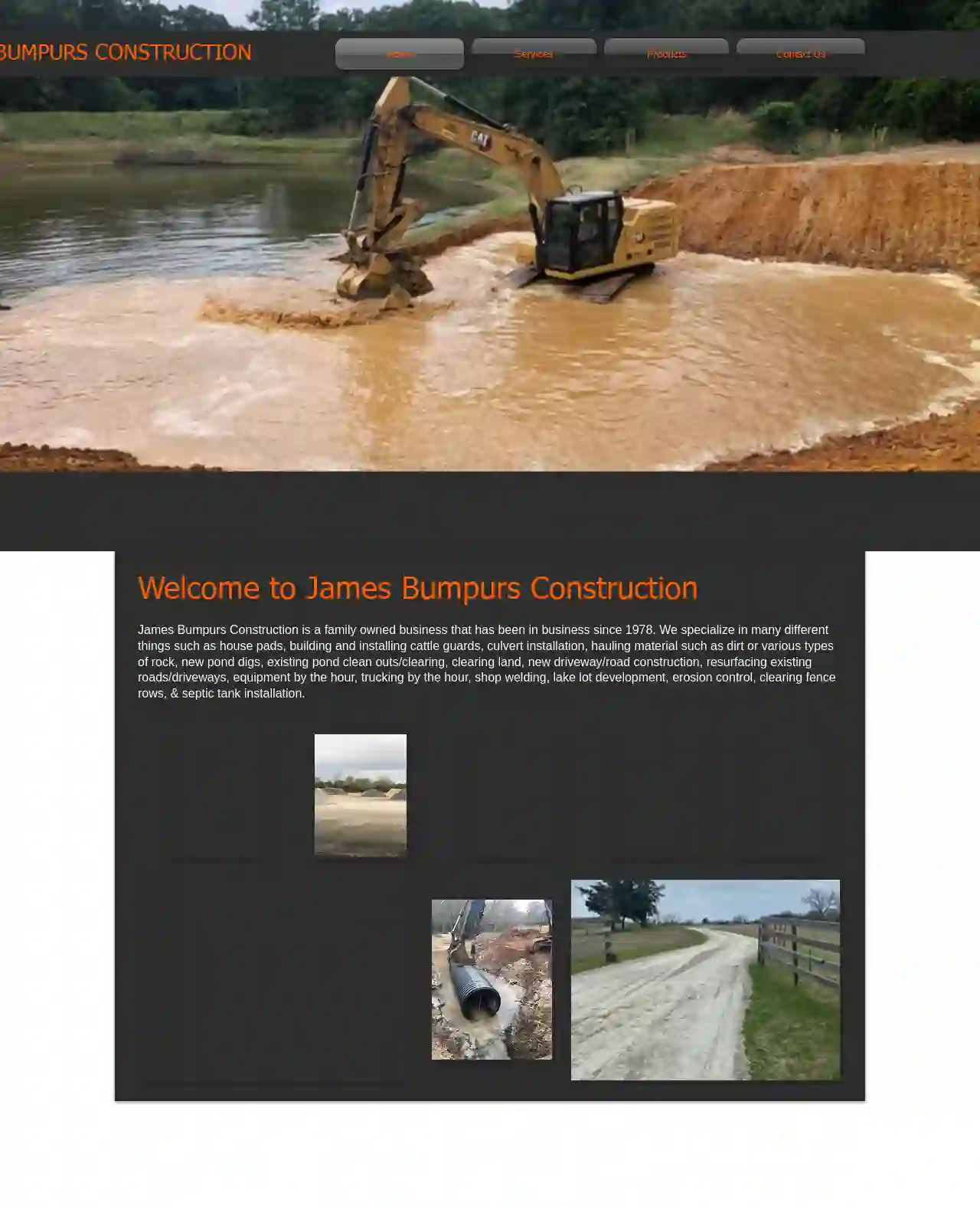
James Bumpurs Construction
4.717 reviewsAmes, USWelcome to James Bumpurs Construction James Bumpurs Construction is a family owned business that has been in business since 1978. We specialize in many different things such as house pads, building and installing cattle guards, culvert installation, hauling material such as dirt or various types of rock, new pond digs, existing pond clean outs/clearing, clearing land, new driveway/road construction, resurfacing existing roads/driveways, equipment by the hour, trucking by the hour, shop welding, lake lot development, erosion control, clearing fence rows, & septic tank installation.
- Services
- Why Us?
- Gallery
Get Quote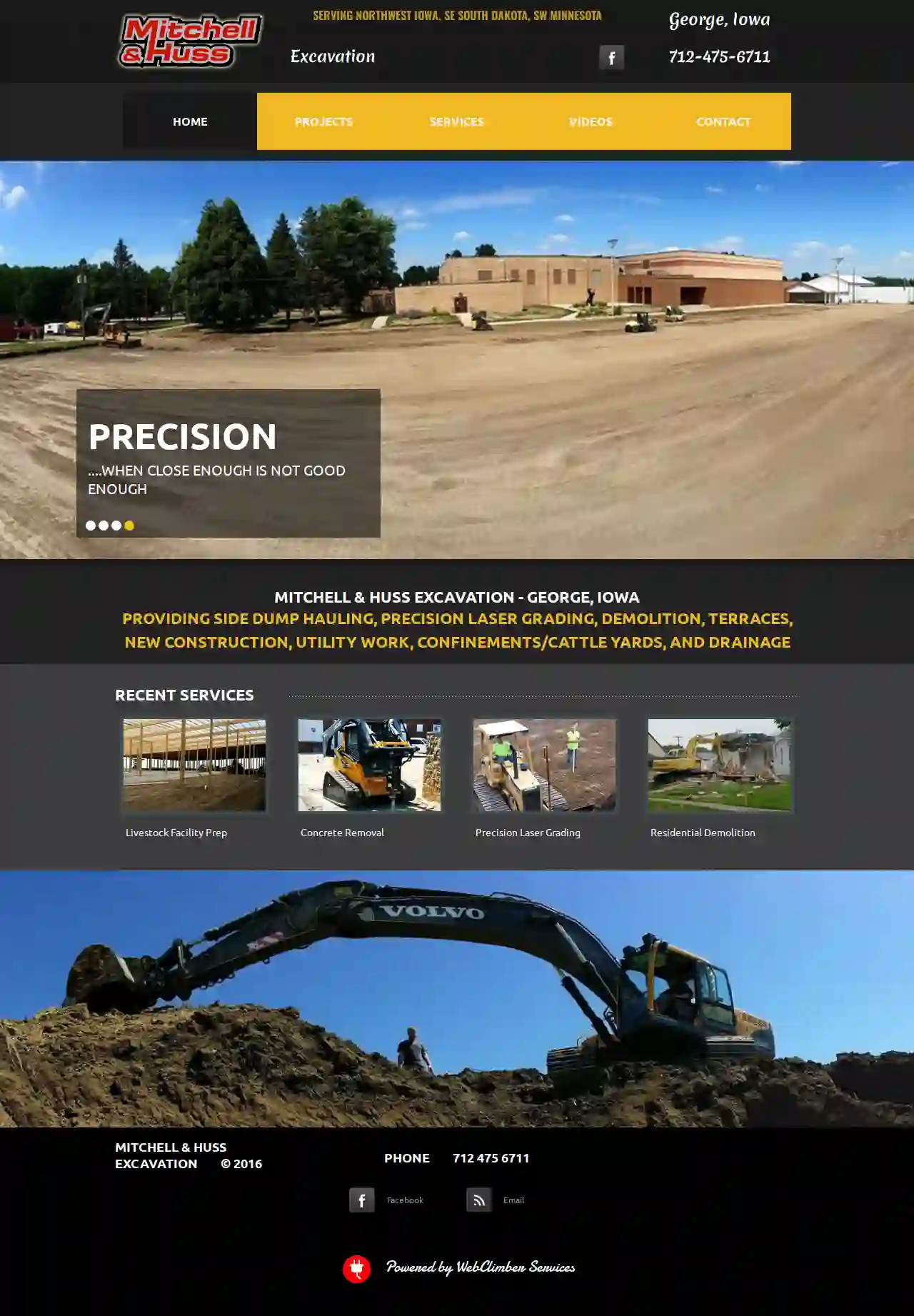
Mitchell & Huss Excavation Inc.
52 reviews201 East Minnesota Avenue, PO Box 517, George, 51237, USMitchell & Huss Excavation: Your Trusted Partner for Excavation Services in Northwest Iowa Established in 2006, Mitchell & Huss Excavation has built a strong reputation for providing reliable and professional excavation services to clients throughout Northwest Iowa, Southeast South Dakota, and Southwest Minnesota. We are committed to delivering high-quality workmanship, exceeding expectations, and ensuring customer satisfaction on every project. Our team of experienced operators and skilled professionals is equipped with a fleet of modern equipment to handle a wide range of excavation needs, from small residential projects to large commercial developments. We take pride in our attention to detail, precision, and efficiency, ensuring that every project is completed on time and within budget. Whether you need site preparation, demolition, utility work, drainage solutions, or any other excavation service, Mitchell & Huss Excavation is your trusted partner. We are dedicated to providing exceptional service and building lasting relationships with our clients. Contact us today to discuss your project and let us help you bring your vision to life.
- Services
- Why Us?
- Gallery
Get Quote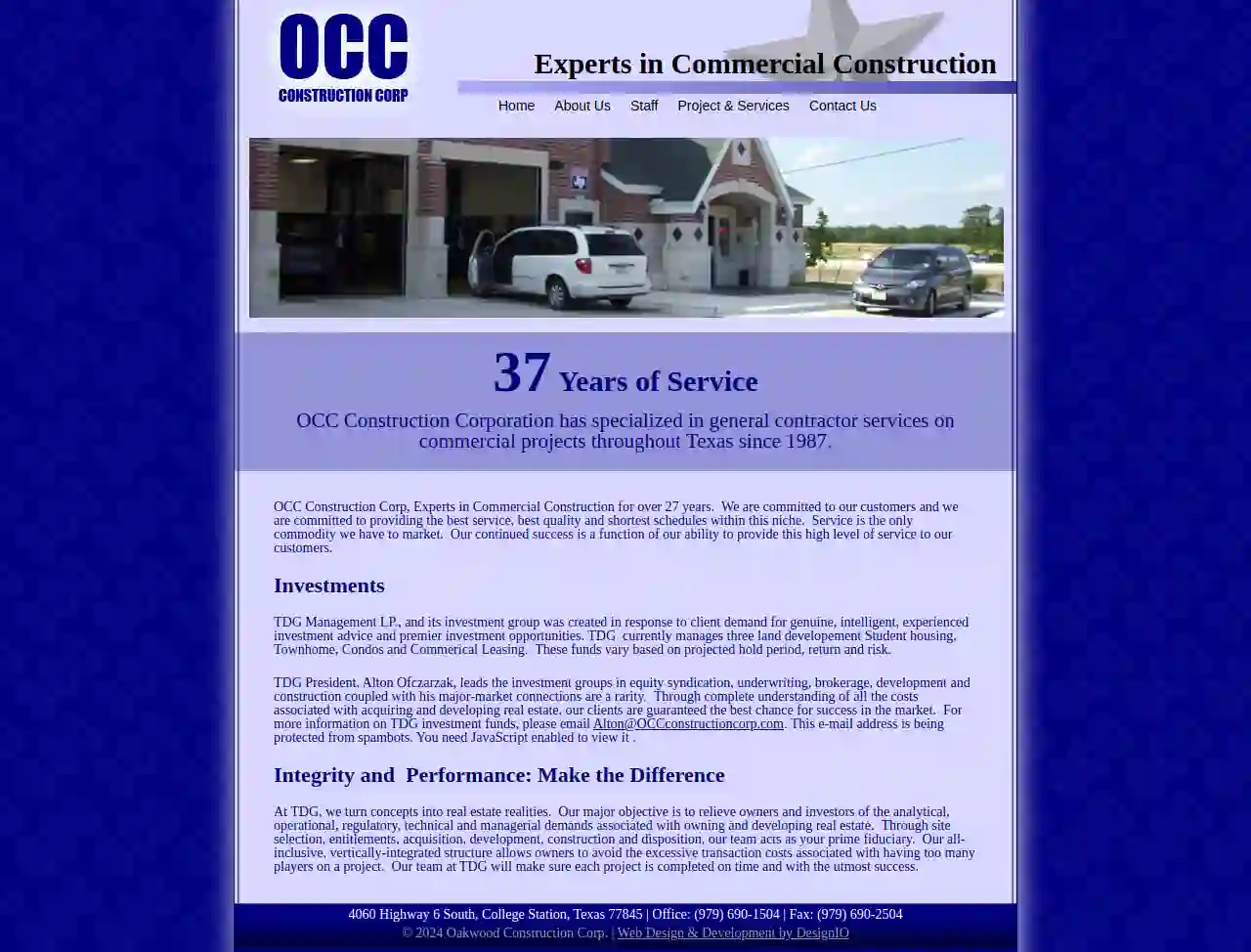
OCC Construction Corporation
32 reviews4060 Highway 6 South, College Station, 77845, USExperts in Commercial Construction OCC Construction Corporation has specialized in general contractor services on commercial projects throughout Texas since 1987. We are committed to our customers and we are committed to providing the best service, best quality and shortest schedules within this niche. Service is the only commodity we have to market. Our continued success is a function of our ability to provide this high level of service to our customers. Investments TDG Management LP., and its investment group was created in response to client demand for genuine, intelligent, experienced investment advice and premier investment opportunities. TDG currently manages three land development Student housing, Townhome, Condos and Commercial Leasing. These funds vary based on projected hold period, return and risk. TDG President, Alton Ofczarzak, leads the investment groups in equity syndication, underwriting, brokerage, development and construction coupled with his major-market connections are a rarity. Through complete understanding of all the costs associated with acquiring and developing real estate, our clients are guaranteed the best chance for success in the market. For more information on TDG investment funds, please email [email protected]. Integrity and Performance: Make the Difference At TDG, we turn concepts into real estate realities. Our major objective is to relieve owners and investors of the analytical, operational, regulatory, technical and managerial demands associated with owning and developing real estate. Through site selection, entitlements, acquisition, development, construction and disposition, our team acts as your prime fiduciary. Our all-inclusive, vertically-integrated structure allows owners to avoid the excessive transaction costs associated with having too many players on a project. Our team at TDG will make sure each project is completed on time and with the utmost success.
- Services
- Why Us?
- Our Team
- Gallery
Get Quote
Jenkins Excavating & Logging LLC
4.617 reviewsJenkins Excavating & Logging, LLC, P.O. Box 447, Culpeper, 22701, USJenkins Excavating & Logging LLC Serving Central & Northern Virginia Certified experts with 20+ years of experience. Contact us today to schedule our specialized services and work with our dedicated team. No job is too big or small! Jenkins Excavating & Logging LLC is a family-owned and operated business with over 20 years of experience in the excavating and logging industry. We are committed to providing our clients with the highest quality services at competitive prices. We are licensed, insured, bonded, and certified to operate in Virginia. We offer a wide range of services to meet the needs of our residential and commercial clients. We are also proud to be a sustainable harvesting and resource professional. We are committed to providing our clients with the best possible service and experience. We are dedicated to providing our clients with the highest quality services at competitive prices. We are also committed to providing our clients with a safe and efficient work environment.
- Services
- Why Us?
- Gallery
Get Quote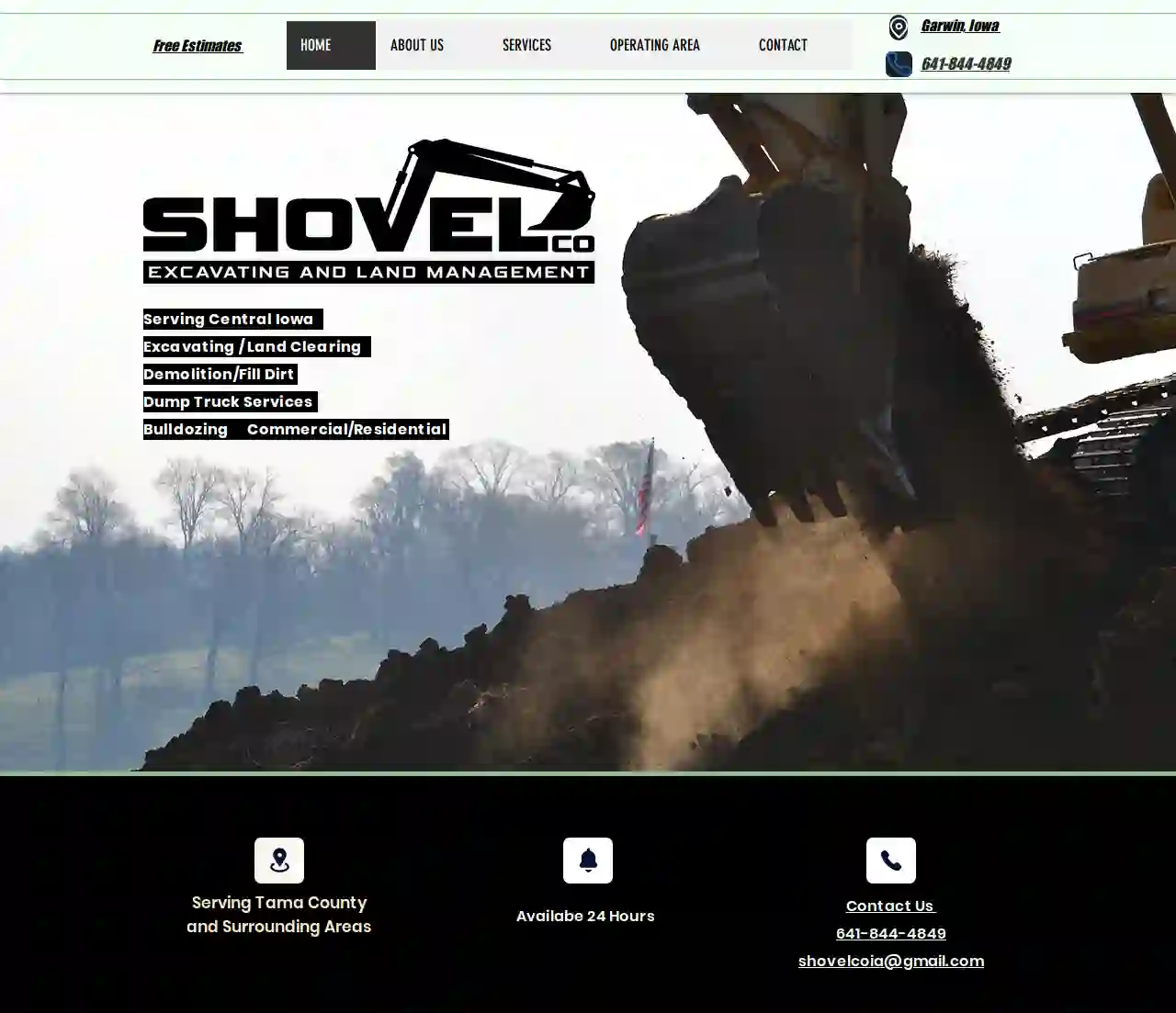
Shovel Co Excavating and Trucking
Des Moines, USShovel Co. IA: Your Trusted Partner for Excavation and Land Clearing in Central Iowa Shovel Co. IA is a locally owned and operated business serving the excavation and land clearing needs of Central Iowa. We are committed to providing our clients with high-quality services at competitive prices. Our team of experienced professionals is dedicated to delivering exceptional results on every project, no matter how big or small. We understand that excavation and land clearing projects can be complex and require a high level of expertise. That's why we use only the latest equipment and techniques to ensure that your project is completed on time and within budget. We also take pride in our commitment to safety and environmental responsibility. Whether you're a homeowner looking to create a new backyard oasis or a commercial developer building a new shopping center, Shovel Co. IA is the team you can trust. Contact us today for a free estimate.
- Services
- Why Us?
- Gallery
Get Quote
Over 22,076+ Excavation Pros registered
Our excavation pros operate in Muscatine & beyond!
ExcavationHQ has curated and vetted Top Excavation Companies in Muscatine. Find the most trustworthy pro today.
Frequently Asked Questions About Excavation Contractors
- Determine the Area: Measure the length and width of the area you want to fill. Multiply them to get the area in square feet (or meters).
- Determine the Depth: Measure the difference between the existing grade and the desired grade (how much you need to raise the ground). This is the depth of fill required.
- Calculate Volume: Multiply the area (step 1) by the depth (step 2) to get the volume in cubic feet (or meters).
- Account for Compaction: Fill dirt compacts when it settles, so add 10% to 25% to the calculated volume to account for compaction. The exact percentage depends on the type of fill material.
- Soil Type and Stability: Stable, cohesive soils allow for deeper excavations than loose or unstable soils.
- Groundwater Level: Excavations below the water table require dewatering techniques to manage water intrusion.
- Equipment and Resources: The size and capabilities of excavation equipment influence the achievable depth.
- Safety Regulations: OSHA and other safety regulations impose limitations on trench depths without proper shoring or sloping.
- Project Requirements: The purpose of the excavation (basement, pool, foundation) determines the necessary depth.
- Clearly Define the Scope: Outline the project's goals, including the excavation area, depth, grade, and intended use.
- Obtain Necessary Permits: Research and acquire any required permits from your local authorities.
- Mark Utility Lines: Contact your utility companies to locate and mark underground utilities to prevent damage.
- Communicate with Neighbors: Inform your neighbors about the project's timeline and potential noise or disruptions.
- Prepare the Site: Clear any obstacles, such as vegetation, furniture, or structures, from the excavation area.
- Discuss Safety Protocols: Review safety procedures with the contractor to ensure a safe work environment.
How do I calculate how much dirt I need for fill?
What is the difference between topsoil and subsoil?
Topsoil: The uppermost layer, typically rich in organic matter, nutrients, and microorganisms. It's essential for plant growth and is often darker in color.
Subsoil: The layer beneath the topsoil, containing less organic matter and generally denser. It provides support for roots but is less fertile than topsoil.
During excavation, topsoil is often removed and preserved separately for later use in landscaping, while subsoil is typically used for backfilling or other less demanding applications.
How deep can you excavate?
What should I do before excavation starts?
How do I calculate how much dirt I need for fill?
- Determine the Area: Measure the length and width of the area you want to fill. Multiply them to get the area in square feet (or meters).
- Determine the Depth: Measure the difference between the existing grade and the desired grade (how much you need to raise the ground). This is the depth of fill required.
- Calculate Volume: Multiply the area (step 1) by the depth (step 2) to get the volume in cubic feet (or meters).
- Account for Compaction: Fill dirt compacts when it settles, so add 10% to 25% to the calculated volume to account for compaction. The exact percentage depends on the type of fill material.
What is the difference between topsoil and subsoil?
Topsoil: The uppermost layer, typically rich in organic matter, nutrients, and microorganisms. It's essential for plant growth and is often darker in color.
Subsoil: The layer beneath the topsoil, containing less organic matter and generally denser. It provides support for roots but is less fertile than topsoil.
During excavation, topsoil is often removed and preserved separately for later use in landscaping, while subsoil is typically used for backfilling or other less demanding applications.
How deep can you excavate?
- Soil Type and Stability: Stable, cohesive soils allow for deeper excavations than loose or unstable soils.
- Groundwater Level: Excavations below the water table require dewatering techniques to manage water intrusion.
- Equipment and Resources: The size and capabilities of excavation equipment influence the achievable depth.
- Safety Regulations: OSHA and other safety regulations impose limitations on trench depths without proper shoring or sloping.
- Project Requirements: The purpose of the excavation (basement, pool, foundation) determines the necessary depth.
What should I do before excavation starts?
- Clearly Define the Scope: Outline the project's goals, including the excavation area, depth, grade, and intended use.
- Obtain Necessary Permits: Research and acquire any required permits from your local authorities.
- Mark Utility Lines: Contact your utility companies to locate and mark underground utilities to prevent damage.
- Communicate with Neighbors: Inform your neighbors about the project's timeline and potential noise or disruptions.
- Prepare the Site: Clear any obstacles, such as vegetation, furniture, or structures, from the excavation area.
- Discuss Safety Protocols: Review safety procedures with the contractor to ensure a safe work environment.